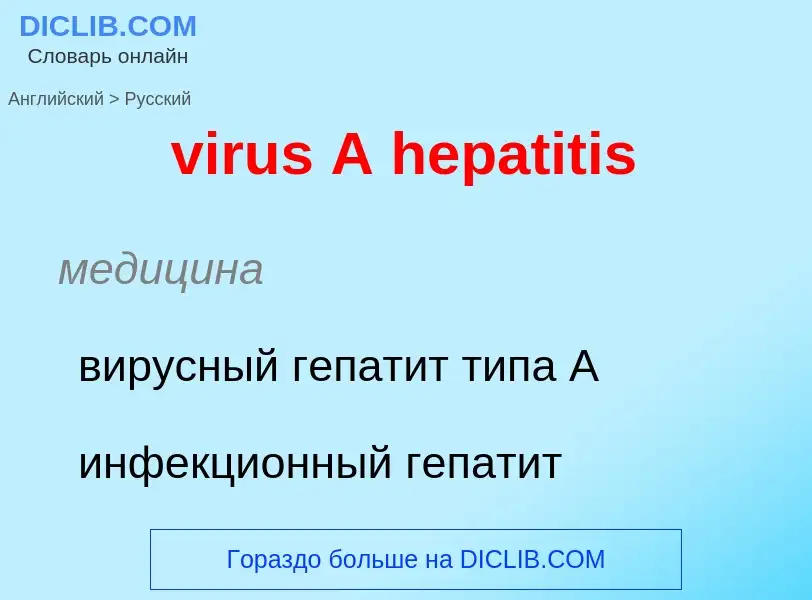Traducción y análisis de palabras por inteligencia artificial ChatGPT
En esta página puede obtener un análisis detallado de una palabra o frase, producido utilizando la mejor tecnología de inteligencia artificial hasta la fecha:
- cómo se usa la palabra
- frecuencia de uso
- se utiliza con más frecuencia en el habla oral o escrita
- opciones de traducción
- ejemplos de uso (varias frases con traducción)
- etimología
virus A hepatitis - traducción al ruso
медицина
вирусный гепатит типа А
инфекционный гепатит
эпидемический гепатит
эпидемическая желтуха
медицина
болезнь Боткина
общая лексика
вирус гепатита
Definición
Wikipedia

Hepatitis A is an infectious disease of the liver caused by Hepatovirus A (HAV); it is a type of viral hepatitis. Many cases have few or no symptoms, especially in the young. The time between infection and symptoms, in those who develop them, is 2–6 weeks. When symptoms occur, they typically last 8 weeks and may include nausea, vomiting, diarrhea, jaundice, fever, and abdominal pain. Around 10–15% of people experience a recurrence of symptoms during the 6 months after the initial infection. Acute liver failure may rarely occur, with this being more common in the elderly.
It is usually spread by eating food or drinking water contaminated with infected feces. Undercooked or raw shellfish are relatively common sources. It may also be spread through close contact with an infectious person. While children often do not have symptoms when infected, they are still able to infect others. After a single infection, a person is immune for the rest of their life. Diagnosis requires blood testing, as the symptoms are similar to those of a number of other diseases. It is one of five known hepatitis viruses: A, B, C, D, and E.
The hepatitis A vaccine is effective for prevention. Some countries recommend it routinely for children and those at higher risk who have not previously been vaccinated. It appears to be effective for life. Other preventive measures include hand washing and properly cooking food. No specific treatment is available, with rest and medications for nausea or diarrhea recommended on an as-needed basis. Infections usually resolve completely and without ongoing liver disease. Treatment of acute liver failure, if it occurs, is with liver transplantation.
Globally, around 1.4 million symptomatic cases occur each year and about 114 million infections (symptomatic and asymptomatic). It is more common in regions of the world with poor sanitation and not enough safe water. In the developing world, about 90% of children have been infected by age 10, thus are immune by adulthood. It often occurs in outbreaks in moderately developed countries where children are not exposed when young and vaccination is not widespread. Acute hepatitis A resulted in 11,200 deaths in 2015. World Hepatitis Day occurs each year on July 28 to bring awareness to viral hepatitis.




